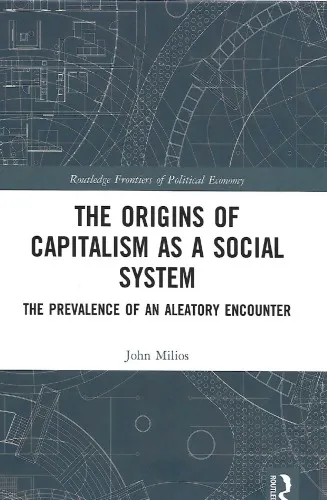Capitalism in the Platform Age: Emerging Assemblages of Labour and Welfare in Urban Spaces (Springer Studies in Alternative Economics)
4.5
Reviews from our users

You Can Ask your questions from this book's AI after Login
Each download or ask from book AI costs 2 points. To earn more free points, please visit the Points Guide Page and complete some valuable actions.Related Refrences:
Introduction to "Capitalism in the Platform Age: Emerging Assemblages of Labour and Welfare in Urban Spaces"
In the age of digital capitalism, the emergence of platform economies has dramatically reshaped the way labor, welfare, and urban spaces interact. "Capitalism in the Platform Age: Emerging Assemblages of Labour and Welfare in Urban Spaces", edited by Sandro Mezzadra, Niccoló Cuppini, Mattia Frapporti, and Maurilio Pirone, is a groundbreaking exploration of the interplay between technology, labor practices, welfare systems, and their entwinement within the fabric of urban life. Rich with interdisciplinary insights, this book dissects the organizational and socio-political transformations triggered by platforms and situates these shifts within the broader narrative of global capitalism. It doesn't merely analyze the effects of platforms as technological entities but digs deep into their profound implications on contemporary capitalism and the human condition.
This volume emerges as a key intellectual resource for understanding the transformative dynamics of platformization in labor relations and welfare structures. It bridges the gap between abstract political theory and grounded empirical case studies, making it both an academic resource and a practical guide for policymakers, activists, and workers navigating these new realities. In the following sections, we provide a detailed summary of the book, highlight its key takeaways, share some impactful quotes, and discuss why this work is of paramount relevance today.
Detailed Summary of the Book
"Capitalism in the Platform Age" is thoughtfully structured around the concept of "assemblages." The editors introduce assemblages as frameworks through which labor, technology, and welfare interact in dynamic and constantly evolving relationships. At its heart, this book examines the restructuring of capitalism facilitated by platforms like Uber, Amazon, and Airbnb, which have transformed traditional supply chains, labor roles, and social reproduction systems. The collection offers an in-depth look at how labor conditions—precarity, gig work, and datafication—are becoming increasingly normalized in urban economies where platforms mediate everyday life.
The book goes beyond the workplace and addresses the profound implications for welfare and state systems. With the privatization of many social services and the increasing role of data-driven platforms in managing urban infrastructure, the book highlights how welfare systems are becoming more fragmented and less accessible. Urban spaces are a recurring focal point, as the book investigates how the platform economy reshapes the physical and cultural landscapes of cities, effectively redefining notions of citizenship, public space, and communal agency.
Drawing on global case studies and critical perspectives, the book critically engages with questions of control, autonomy, and the future of labor in an era where platforms seem to erode traditional economic and political norms. Each chapter builds upon a nuanced interplay between empirical research and theoretical arguments, creating a cohesive narrative that takes readers on a journey from the streets of modern cities to the boardrooms of multinational corporations.
Key Takeaways
- Platform economies do not merely disrupt industries—they redefine the structures and frameworks of labor, welfare, and urban life.
- The gig economy normalizes labor precarity while complicating traditional worker rights and benefits frameworks.
- Platforms increasingly govern urban spaces by capturing value through data and commodifying public life.
- The intersection of platformization and welfare policies risks deepening existing inequalities while creating new socio-economic divides.
- Critical resistance and alternative imaginaries are essential for rethinking how technology can serve public good rather than corporate profits.
Famous Quotes from the Book
"The gig economy is not only a new form of labor organizing but a reshuffling of what it means to work, to live, and to belong in a city."
"Every time a platform captures data from its users, it inscribes itself deeper into the infrastructures of society, often invisibly."
Why This Book Matters
The significance of "Capitalism in the Platform Age" lies in its ability to connect technical, economic, and social issues in a comprehensive and accessible way. In a world where digital platforms continue to infiltrate every aspect of life, this book challenges readers to rethink the ideologies driving technological innovation and the societal implications they bring. It fosters an understanding that platform capitalism isn't an isolated phenomenon but part of a broader metamorphosis of global capitalism, with far-reaching consequences for labor, welfare, and urban life.
By situating platform economies within the wider framework of capitalism, the book equips readers to critically analyze emerging forms of exploitation and exclusion while carving out spaces for alternatives. It is a must-read for anyone—academics, policymakers, activists—seeking to grasp how technology intersects with our most fundamental social and economic systems. In an era defined by uncertainty and transformation, this volume provides an essential toolkit for critically navigating, challenging, and reshaping the future.
Free Direct Download
You Can Download this book after Login
Accessing books through legal platforms and public libraries not only supports the rights of authors and publishers but also contributes to the sustainability of reading culture. Before downloading, please take a moment to consider these options.
Find this book on other platforms:
WorldCat helps you find books in libraries worldwide.
See ratings, reviews, and discussions on Goodreads.
Find and buy rare or used books on AbeBooks.
1320
بازدید4.5
امتیاز0
نظر98%
رضایتReviews:
4.5
Based on 0 users review
Questions & Answers
Ask questions about this book or help others by answering
No questions yet. Be the first to ask!














